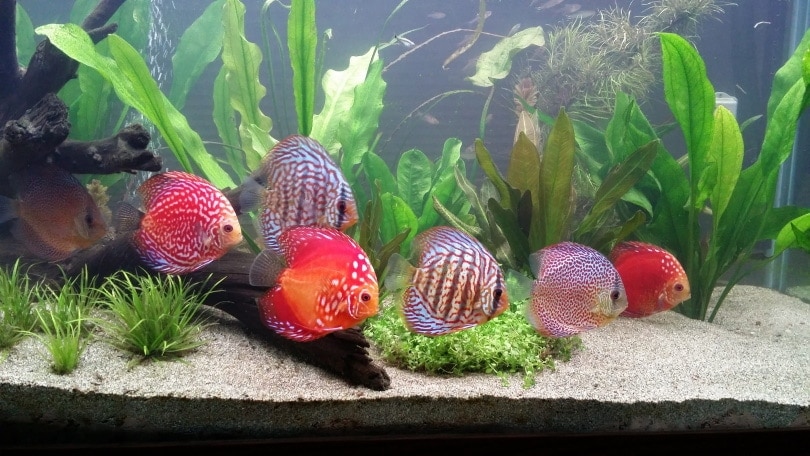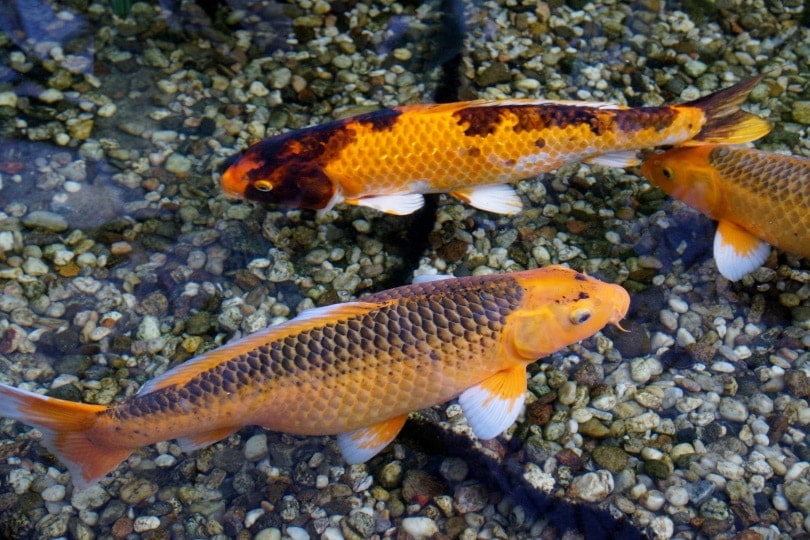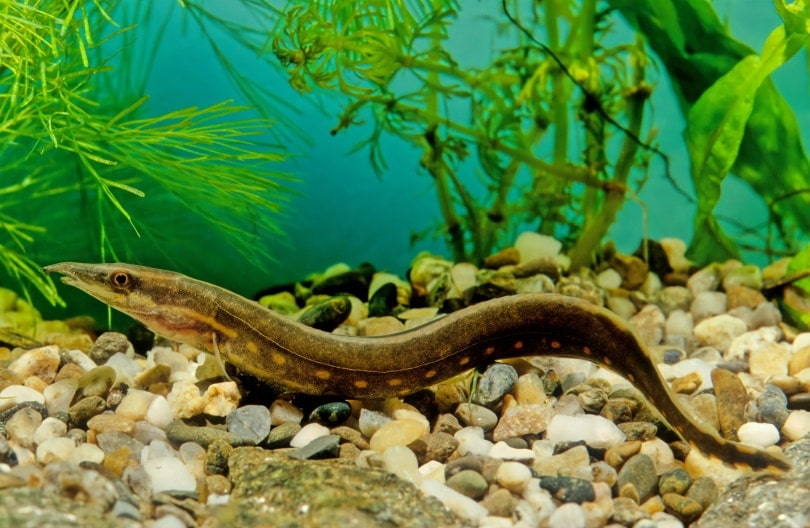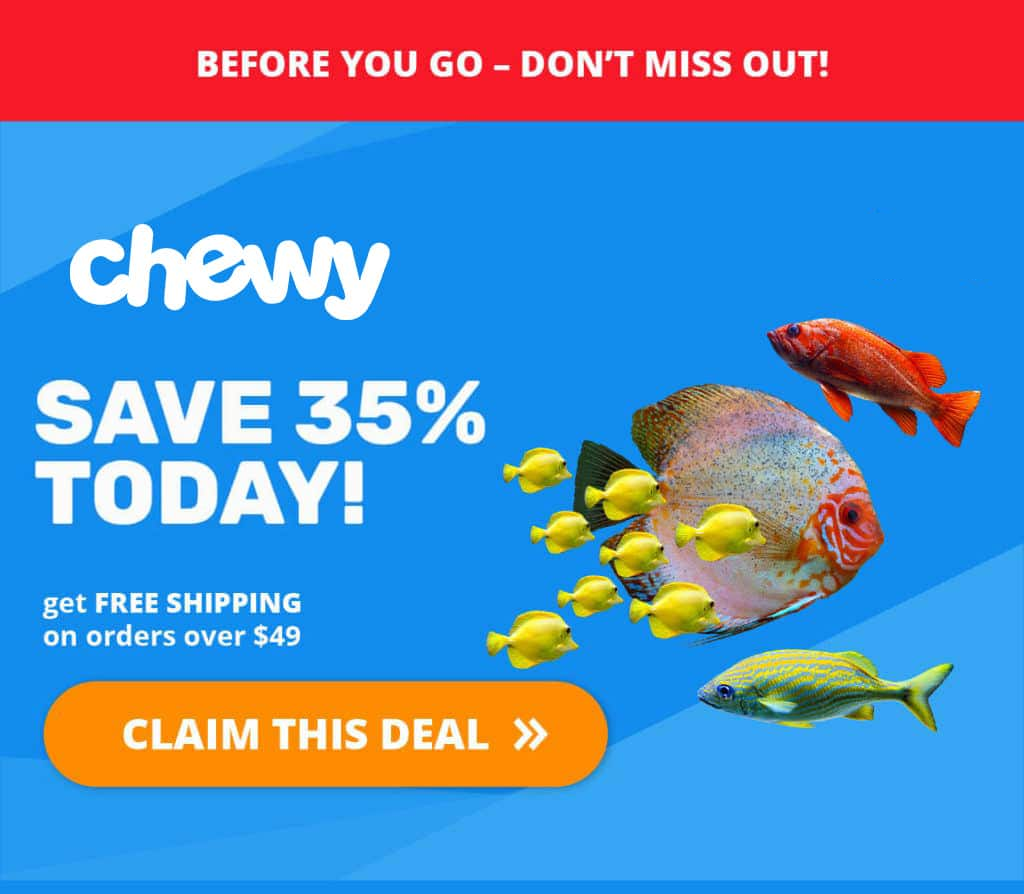5 Great Tank Mates for Koi Fish (With Pictures)
Updated on
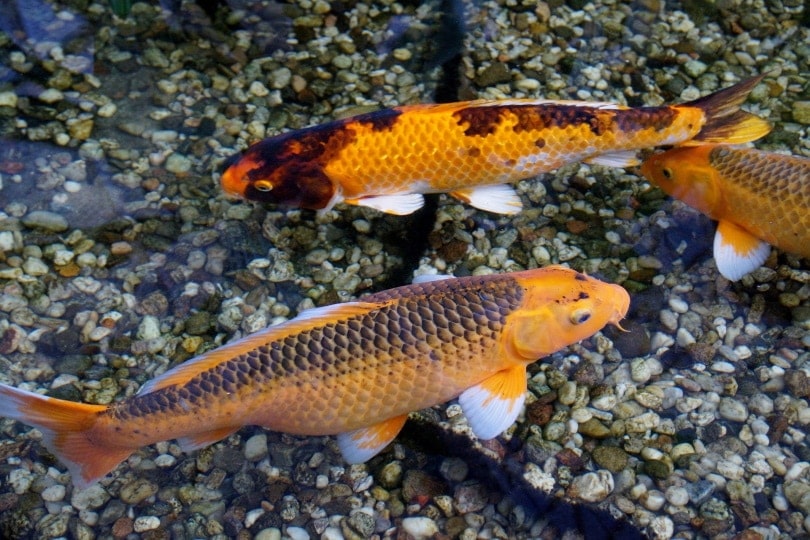
Click to Skip Ahead
Koi are colorful descendants of wild carp. They are like the popular goldfish, yet they have certain physical features that make them vastly different. Koi grow to an average size of 16 to 20 inches—this makes them huge fish that can easily swallow many types of fish commonly kept in captivity. Koi are freshwater fish that do not belong in tanks. Instead, they should inhibit large ponds to thrive and remain healthy.
This can make choosing tank mates difficult for your koi, but luckily there are a few fish and invertebrates that can share a cold-water pond with koi.
The 5 Great Tank Mates for Koi Fish
1. Common Goldfish (Carassius auratus) – Best for Ponds
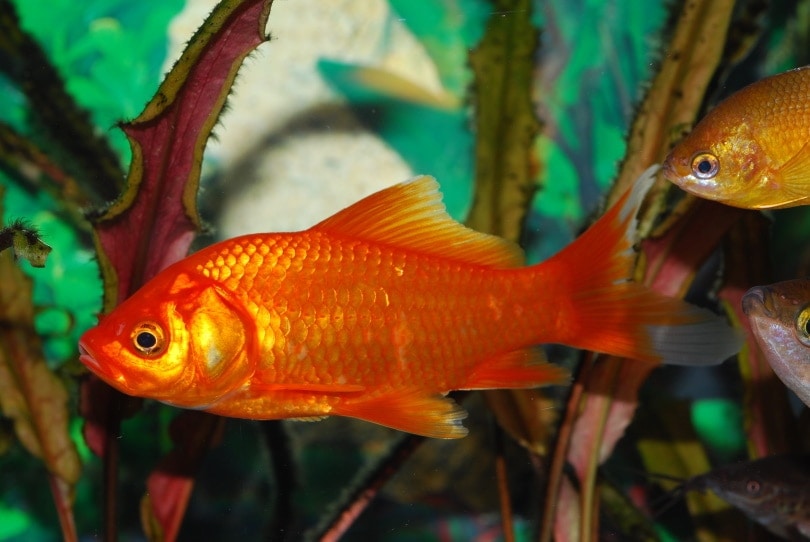
| Size: | 10–18 inches |
| Diet: | Omnivore |
| Minimum pond size: | 150 gallons |
| Care Level: | Beginner |
| Temperament: | Peaceful |
Common goldfish are excellent tank mates for koi. These fish grow large and have sleek bodies which makes them good swimmers. They are related to koi and are often referred to as the koi fish’s cousin. Common goldfish are cold-water fish that can safely handle the same water conditions as koi. They are peaceful and do not bother koi when kept together. You will need to keep more than one common goldfish in your koi pond because they like to group for safety.
2. Shubunkins (Carassius auratus)
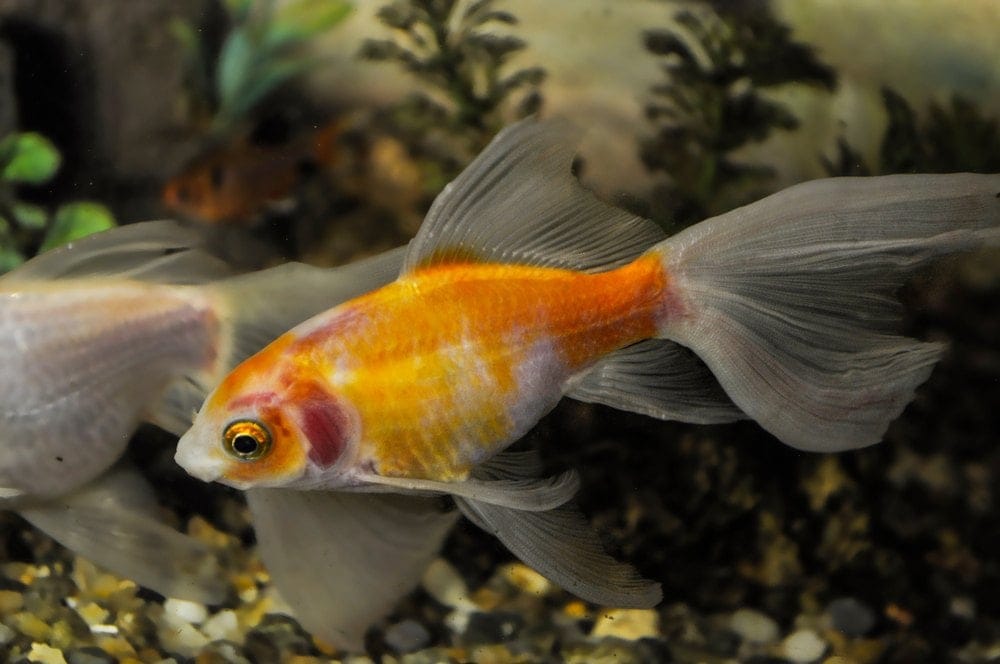
| Size: | 7–15 inches |
| Diet: | Omnivore |
| Minimum pond size: | 100 gallons |
| Care Level: | Beginner |
| Temperament: | Peaceful |
The shubunkin is a prettier version of the common goldfish. They have longer tail fins and their body is deep-set. They have a unique color pattern with a small head. They should only be placed with koi when they are at least 6 inches in length, otherwise, there is a risk of being eaten by adult koi.
3. Comets (Carassius auratus)
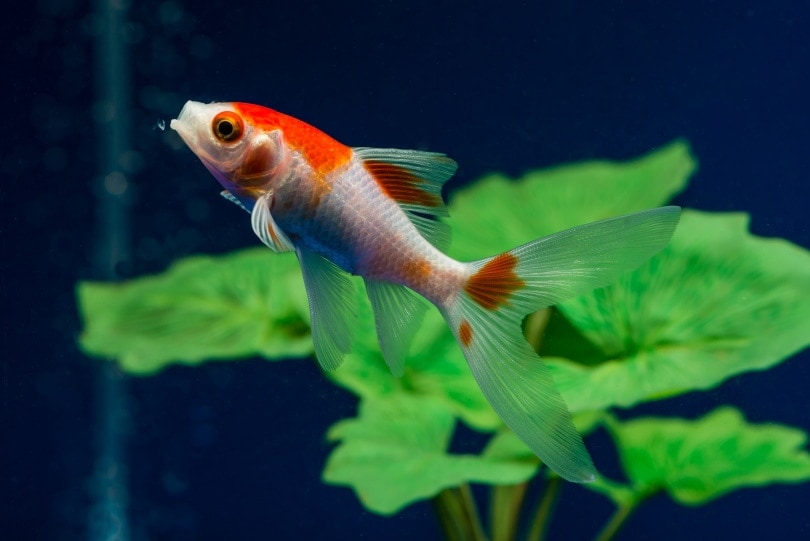
| Size: | 8–16 inches |
| Diet: | Omnivore |
| Minimum pond size: | 100 gallons |
| Care Level: | Beginner |
| Temperament: | Peaceful |
Comet goldfish are quite like common goldfish except for the fact that they have longer fins that drape around the fish. The tail can get if the fish’s body itself and they look great when paired with butterfly koi fish. Comet goldfish get slightly smaller than common goldfish, yet they require the same water parameters as both koi and common goldfish do.
4. Apple snails (Ampurllariidae)
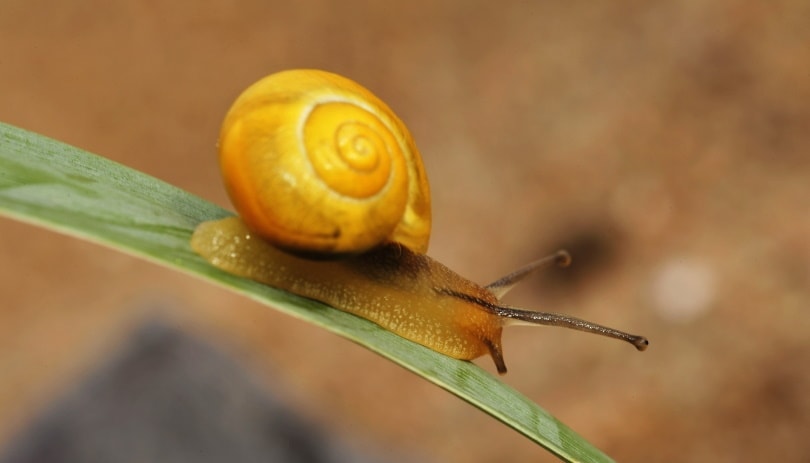
| Size: | 3–4 inches |
| Diet: | Omnivore |
| Minimum pond size: | 20 gallons |
| Care Level: | Beginner |
| Temperament: | Peaceful |
These large snails grow too big to be at risk of being eaten by koi. They are brown or tan and have blue or white feet. They can be kept in a pond with goldfish and koi. Koi may eat small snails and they control snail pond populations by eating their hatchlings. Apple snails are the only freshwater snail that grows large enough to not be eaten by most koi.
5. Golden Orfe (Leuciscus idus)
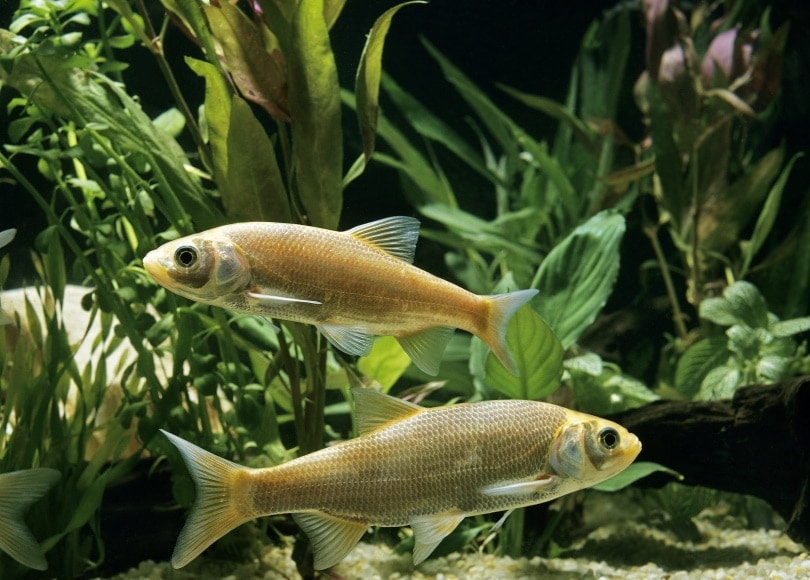
| Size: | 15–20 inches |
| Diet: | Carnivore |
| Minimum pond size: | 300 gallons |
| Care Level: | Intermediate |
| Temperament: | Peaceful |
The golden orfe is a large growing fish that can be housed outdoors with koi. They grow larger than koi and have a deep-set body that is orange with a silver base color. They eat the same foods as koi and when kept in pairs or more they can get along well with many variations of koi.
What Makes a Good Tank Mate for Koi?
Other large growing goldfish like the shubunkin, comet, or common goldfish are the best tank mates for koi. These fish are all descendants of carp which makes them thrive in the same environment. If you want to keep a mixture of goldfish with koi, each breed of single-bodied can be housed with koi and you can mix them to make the pond more colorful and attractive.
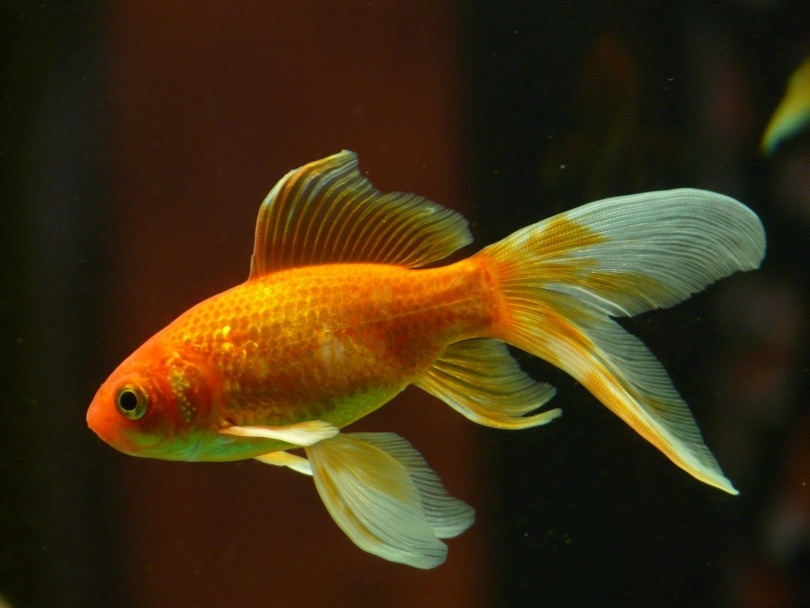
Where Do Koi Prefer to Live in the Aquarium?
Koi fish choose to swim in the middle of the pond where they can easily be viewed from the top. Koi have been bred to have good finnage and colors that look best when you are peering into the pond built into the ground. This allows you to easily see the colors and patterns of both koi and its tank mates. Koi will also skim the surface of the water in search of insects and their larvae.
- Related Read: How To Clear Muddy Koi Pond Water: 4 Methods
Water Parameters
Koi are hardy and can withstand harsh water parameters. However, they still need a filter and regular tank maintenance should be done You can use a pond testing kit to determine the levels of ammonia, nitrite, and nitrate present in the water. Ponds that receive a lot of light will grow a significant number of algae which can help reduce the nitrate levels in your pond.
- Ammonia: 0ppm
- Nitrate: 5–20ppm
- Nitrite: 0ppm
- Gh: 6–8
- Kh: 5–7
- Ph: 6.8 to 7.5
Size
Koi grow extremely large at around 15 to 20 inches. They can grow twice the size of a regular goldfish which is why they cannot be kept in a standard home aquarium. Their size makes them difficult to house in indoor ponds because of the curved sides. The pond must be a minimum of 400 gallons for a group of juvenile koi, but it should be increased if you want to keep goldfish or golden orfes in the same pond.
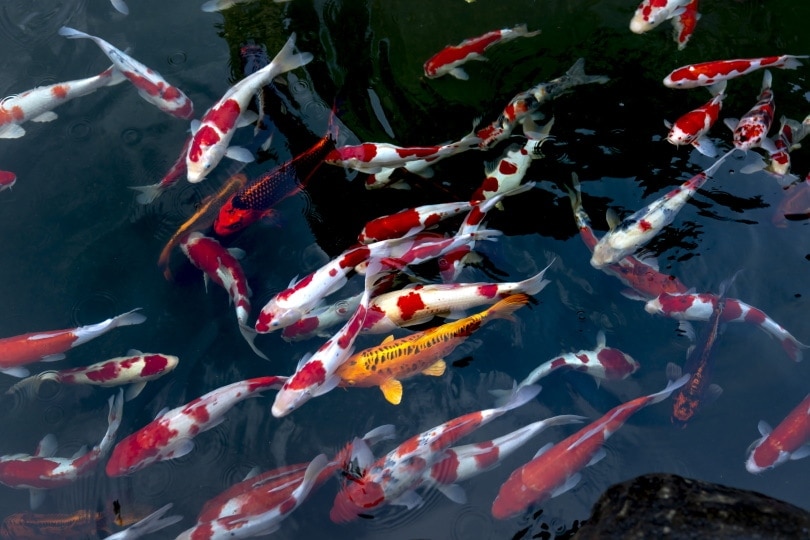
Aggressive Behaviors
Koi are not aggressive at all; they are the complete opposite. Koi are very friendly and peaceful fish that do not fight or nip at other fish. These fish are known to eat small snails, crustaceans, and other small fish. This falls part of their natural diet and they do not do it out of aggression. Koi fish enjoy being kept in pairs or more so that they feel safer.
The Benefits of Having Tank Mates for Koi in Your Aquarium
Comfort
Having different tank mates with koi will make them feel safe. Koi enjoy being surrounded by their kind or even other types of fish. This lowers their stress levels, and they enjoy grouping with each other like they would in the wild.
Variety
Adding more fish with koi makes the pond more colorful and diverse. A natural-styled pond brings out the vivid colors of koi and goldfish to make viewing the pond a fun experience.
Special Considerations When Keeping Koi with Other Fish
If you decide to house goldfish or golden orfes with your koi fish, there are some special considerations to be made so that you can ensure each fish is thriving in its environment. The first step is to decide on a pond size according to the number of fish you want to keep in it. Here is a basic guideline for stocking a koi pond, although it is not super strict and should just give you a general idea:
- 300 gallons: 4 koi, 2 shubunkins, apple snails
- 400 gallons: 6 koi, 2 comets, apple snails
- 500 gallons: 7 koi, 3 comets, 2 commons, 2 shubunkins, 2 golden orfes
- 600 gallons: 8 koi, 4 commons, 3 comets, 3 shubunkins, 2 golden orfes
- 800 to 1,000 gallons: 10 koi, 3 commons, 4 shubunkins, 4 comets, apple snails, 4 golden orfes
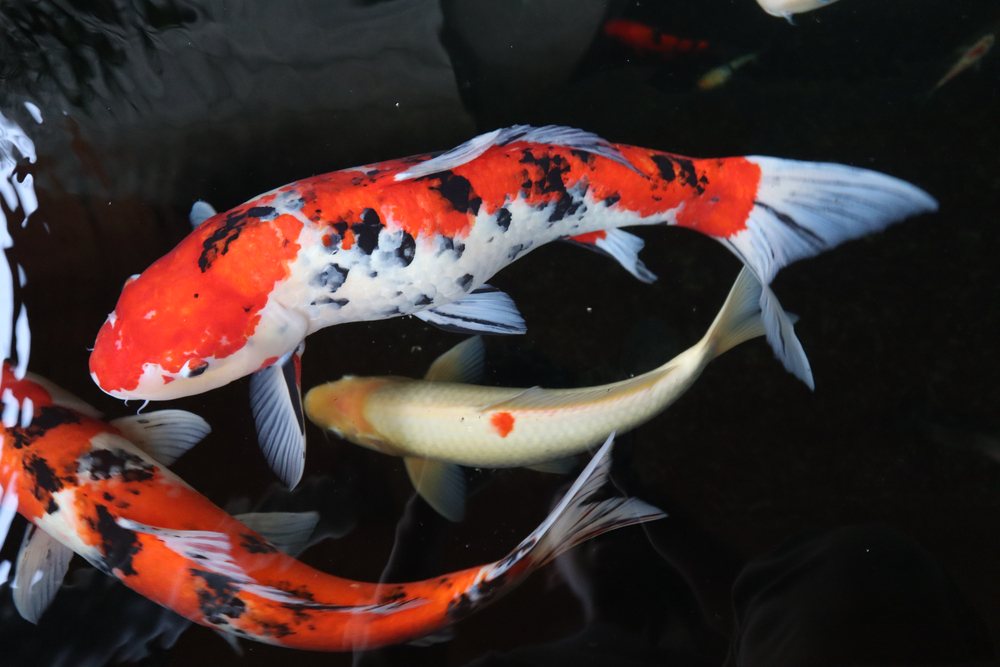
Conclusion
Although there are not a lot of tank mates suitable for koi ponds, goldfish, golden orfes, and snails are the most recommended. Many people will attempt to house tropical fish in a koi pond and fail due to the fish not being able to adapt to the conditions koi are used to. Always make sure koi tankmates are large enough to not fit in their mouths, otherwise, they will eat them.
If you plan to keep an outdoor koi pond, use transparent wire to cover the top of the pond to prevent predators from disturbing your pond inhabitants.
- Related Read: 151 Fun Koi Fish Names For All The Colors
Featured Image Credit: ivabalk, Pixabay



